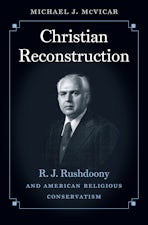William James
Psychical Research and the Challenge of Modernity
By Krister Dylan Knapp
400 pp., 6.125 x 9.25, 10 halftones, 1 table, notes, bibl., index
-
Paperback ISBN: 978-1-4696-6875-8
Published: November 2021 -
Hardcover ISBN: 978-1-4696-3124-0
Published: May 2017 -
E-book EPUB ISBN: 978-1-4696-3125-7
Published: March 2017 -
E-book PDF ISBN: 979-8-8908-5270-0
Published: March 2017
Buy this Book
- Paperback $35.95
- Hardcover $39.95
- E-Book $19.99
For Professors:
Free E-Exam Copies
Knapp explains how and why James found in psychical research a way to rethink the well-trodden approaches to classic Euro-American religious thought, typified by the oppositional categories of natural vs. supernatural and normal vs. paranormal. He demonstrates how James eschewed these choices and instead developed a tertiary synthesis of them, an approach Knapp terms tertium quid, the third way. Situating James's psychical research in relation to the rise of experimental psychology and Protestantism’s changing place in fin de siècle America, Knapp asserts that the third way illustrated a much broader trend in transatlantic thought as it struggled to navigate the uncertainties and religious adventurism of the modern age.
About the Author
Krister Dylan Knapp is senior lecturer in the department of history at Washington University in St. Louis.
For more information about Krister Dylan Knapp, visit
the
Author
Page.
Reviews
“Knapp painstakingly demonstrates just how much time James devoted to psychical research (perhaps more than to any other individual endeavor) and how the lessons James drew from that subject informed several of his key doctrines.”--Reading Religion
“Essential reading for anyone who wishes to have a thorough understanding of James's work in psychology and philosophy, or to assess his substantial contributions to psychical research.”--Fortean Times
“Brilliantly solidifies James's stature as a philosophical psychologist who pioneered the understanding of 'exceptional mental states.' Highly recommended.”--Choice
“Knapp offers a thoughtful and well-argued analysis of the increasing centrality of subjectivity that permeates James’s thought, informed his vision of reality as flexible and fluid, and defines him as a proto-modernist.”--Bulletin of the History of Medicine
“An impressively researched and clearly written analysis that examines neglected ways that James’s psychical research influenced his philosophical, scientific, and religious ideas.”--American Historical Review
“A well-written and detailed account of the place and trajectory of psychical research in James’s thought.”--The Journal of American History



